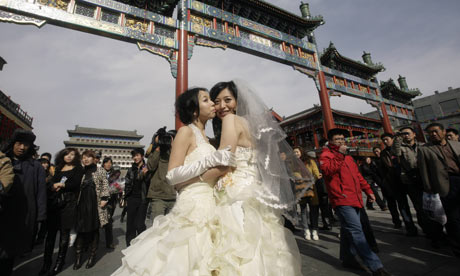Many moons ago, SBF had a headache. (Bear with me, this story does get better.) He asked me for some painkillers so I rummaged in my handbag pharmacopoeia, eventually producing some cocodamol. As he returned from the kitchen, he handed me a cup of tea and picked up the tablets, and he said:
"Dude, this is just like the First Opium War."
...
Actress Lü Liping, winner of last year's Golden Horse award for Best Actress (and born-again evangelical Christian), caused a spectacular shitstorm in the Chinese media for posting homophobic messages to her Weibo account (the Chinese equivalent of Twitter) - referring to gay people as "shameful" and "sinners" and a whole load of other witterings from the blah blah My God Thinks You Are Icky stable. Which is paradoxically awesome: the public outcry has been quite the stir; gay rights groups have called for a boycott of Lu's movies; the Golden Horse Awards have uninvited her from the 2011 ceremony; and - significantly - CCTV, the state television network, mouthpiece of the government, and unfortunately-named from a strictly UK standpoint, has denounced Lu's remarks:
In the report on the programme "24 Hours" on the CCTV News channel, host Qiu Qiming (邱启明) held out unusually harsh words for Lü Liping, urging her to "reconsider her ways". He said, "We respect the faith of individual celebrities, and we allow them to have their own point of view on issues. But, that does not mean that we agree that a person of such influence should have the power to openly discriminate against certain communities in China."
”There is no doubt," Qiu added, "that the sexual orientation of certain people in our midst are different from the rest of us. But they are also diligently contributing to society. Gay people, like us, have the right to exist and develop themselves in society, and this right should not be overtaken by any other concept.“
And in a reference to Voltaire's famous aphorism, Qiu said in closing, "We'd like to say a word to the gay community -- and it's something we've all heard many times over -- I may not agree with the way you live, but I will defend your right to be different from me."...
After SBF told me about this, I said, "awesome! Give me some links so I can blog about it!" he warned that writing anything which could be construed as positive about China would be read by many as "authoritarian government is FANTASTIC!". Which is interesting in itself. Other topics of discussion last night included this terrifying article about Texas schools with their own police forces, and the horrific abuses that are going on. SBF pointed out that a similar article set in China would provoke instant condemnation for what is an obvious infringement of these children's rights - but the response to extreme behaviour in the US is more nuanced. Not that such behaviour is condoned, but it is understood as not being representative of the entire country. Part of this is a result of familiarity: we have a number of stereotypes to hang new information about the US on (groovy San Francisco gay man, slack-jawed yokel hillbilly, uptight New York careerist, scary Southern evangelical) - but for China the vast majority of UK readers have just one: Authoritarian Government. And sure, the US stereotypes don't tell the whole story about the country either, but the variety at least means that one fucked-up act by one group of people is not generally used as a stick to beat all 312,842,000 Americans with.
I mean: can we take it as read that I think authoritarian government is bad? Human rights abuses are bad. Imprisoning dissidents is bad. Censorship is bad.
Raiding gay bars, too, is bad: no one is claiming China as a big gay haven.There are different currents in any society, moving in different directions and reacting against each other, so one promising development can be swiftly followed by what looks like a giant step back. That doesn't mean we dismiss the little step forward as worthless.
In general conversation I'd tend to assume that these tenets are accepted by all participants until they demonstrate otherwise. So, to sum up: this is a heartening development in the fight for gay equality in China. The end.

No comments:
Post a Comment